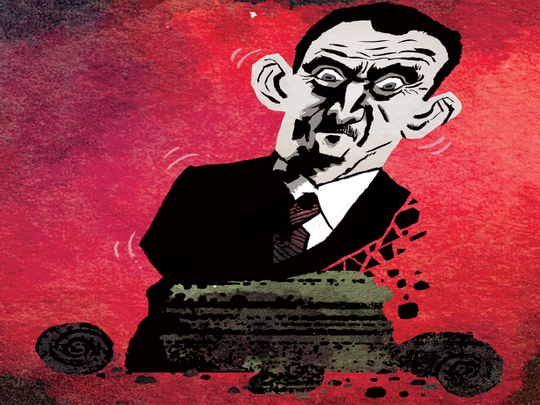
Yes, one can safely say that Syrian President Bashar Al Assad could unfortunately be winning the battle, but not necessarily the war. At best, he will continue for a little longer, but eventually he is on his way out. So far, his line of command seems, for now, to be sustainable — thanks to Iranian-Russian direct support, but these same supporters will, at one point, have to consider different outcomes that would ease the way for a negotiated retirement. This would nicely fit with the Russian proposition of a ‘federal solution’ as Moscow has recently suggested for a final settlement in the country.
Of course there is nothing concrete yet but the latest agreement of both United States and Russia on a joint plan to cease hostilities in Syria, is of a great significance at this critical moment of the Syrian war. Both the Syrian government and the main opposition umbrella group have accepted the terms of the joint deal between Moscow and Washington. The growing threat from Daesh (the self-proclaimed Islamic State of Iraq and the Levant) has obviously made it logically possible for the Americans and Russians to reach such a deal. Their inability to speak previously in one voice and act with conviction has most certainly encouraged extremist groups such as Daesh and Jabhat Al Nusra to seize large sections not only in Syria, but also in Iraq.
Al Assad had already questioned whether it would be possible to cease hostilities and implement the ceasefire. But it is clearly not up to him to decide the future of war or peace in Syria without the full blessing of his main backers. Russian air strikes and direct financial and logistic support from Iran have lately helped Al Assad win key battles in the five-year-long war. In fact, he would have gone long ago had it not been for the immediate help the Iranian authorities had urgently extended to him since the first year of the war. Even this direct help with thousands of Iranian troops and special forces on the ground were not enough to sustain the Al Assad government as the time had passed by. Therefore, Tehran had facilitated for thousands of ‘Hezbollah’ militia to cross from Lebanon into Syria to fight off opposition groups led by the Free Syrian Army in strategic positions.
Without such direct Russian-Iranian support, Al Assad’s army would have retreated from substantial parts of Syria’s territories and would have been unable to gain momentum on the battlefield. We have lately seen how his army has significantly advanced into new positions, whether around the key cities of Aleppo, Homs or in the Damascus countryside, that until very recently were under the control of the armed opposition forces.
Lack of air power
The weakest point of the opposition is their lack of air power. The regime’s ability in Damascus to mobilise Russian air strikes to support his forces and their deployment of deadly barrel bombs is not something the opposition can easily match. Without receiving shoulder-to-air missiles, which only America can either provide, the opposition is doomed. History shows us how greatly significant these systems were in the hands of the Taliban in Afghanistan in neutralising Soviet air power through the use of shoulder-fired anti-aircraft missiles supplied by the United States.
Many analysts agree it’s likely that without Iran’s backing in the early years of the war, Al Assad would have become history. Now with the continued deployment of Iranian ground troops and various militia under Hezbollah’s banner, as well as the colossal Russian air power, Al Assad feels reassured that his position on the battlefield is sustainable.
But, is it? Maybe not.
Depending on a few allies against the world’s vast majority that would like to see him go, cannot be viable in the long term. Al Assad has irreparably lost the many friends he had successfully recruited during the first ten years of his rule that he inherited from his father who uninterruptedly controlled Syria for three decades. He was the darling of former British prime minister Tony Blair and former French president Jacques Chirac in the early 2000s. Al Assad and his English-born wife (herself of Homs origin), Asma Al Akhras, were, for a period, on top of the guest list of several world leaders. Al Assad had also succeeded in gaining the trust of Turkey’s president and had very close relations with the Saudis. But all of that is gone now.
All these former close friends are now saying that Al Assad must go. The Saudis and Turks and even some parties of the US-led alliance are also saying they are going to use their F-16 fighter jets and commando forces in northern Syria in aid of opposition rebels. In fact, there are reports that indicate advance small personnel are already operating in the north in preparation of potential attacks against Al Assad’s forces in the future. However, Al Assad may have, in a sense, won an important strategic battle in the short term, namely, to prolong his stay in power. But the war is not over yet.
It is difficult to imagine how possibly a head of state, whose hands are bloodied by the abhorrent killings of 280,000 of his country’s people and turning half of its population into refugees inside and outside the country, can stay in power for a meaningful length of time. The best his backers can do is get him to accept a process of transition in preparation for his ultimate retirement. Whatever the outcome of the current ceasefire, the era of the Al Assad dynasty is fast coming to a close.
Mustapha Karkouti is a former president of the Foreign Press Association, London. You can follow him on Twitter at www.twitter.com/@mustaphatache










